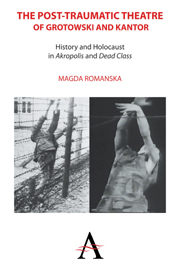 The Post-traumatic Theatre of Grotowski and Kantor
The Post-traumatic Theatre of Grotowski and Kantor Book contents
- Frontmatter
- Contents
- Foreword by Kathleen Cioffi
- Preface
- Acknowledgments
- List of Illustrations
- Introduction
- Part I Our Auschwitz: Grotowski's Akropolis
- Chapter 1 Jerzy Grotowski: A Very Short Introduction
- Chapter 2 Native Son: Grotowski in Poland
- Chapter 3 Grotowski: The Polish Context
- Chapter 4 Grotowski, the Messiah: Coming to America
- Chapter 5 The Making of an Aura
- Chapter 6 On Not Knowing Polish
- Chapter 7 “In Poland: That is to Say, Nowhere”
- Chapter 8 Akropolis/Necropolis
- Chapter 9 The Vision and the Symbol
- Chapter 10 “This Drama as Drama Cannot Be Staged”
- Chapter 11 Two National Sacrums
- Chapter 12 “Hollow Sneering Laughter”: Mourning the Columbuses
- Chapter 13 Against Heroics
- Chapter 14 Representing the Unrepresentable
- Chapter 15 Trip to the Museum
- Chapter 16 Bearing the Unbearable
- Chapter 17 The Living and the Dead
- Chapter 18 Jacob's Burden
- Chapter 19 The Final Descent
- Chapter 20 Textual Transpositions
- Chapter 21 Akropolis After Grotowski
- Part II Our Memory: Kantor's Dead Class
- Postscript
- Appendix
- Notes
- Bibliography
- Index
Chapter 10 - “This Drama as Drama Cannot Be Staged”
from Part I - Our Auschwitz: Grotowski's Akropolis
- Frontmatter
- Contents
- Foreword by Kathleen Cioffi
- Preface
- Acknowledgments
- List of Illustrations
- Introduction
- Part I Our Auschwitz: Grotowski's Akropolis
- Chapter 1 Jerzy Grotowski: A Very Short Introduction
- Chapter 2 Native Son: Grotowski in Poland
- Chapter 3 Grotowski: The Polish Context
- Chapter 4 Grotowski, the Messiah: Coming to America
- Chapter 5 The Making of an Aura
- Chapter 6 On Not Knowing Polish
- Chapter 7 “In Poland: That is to Say, Nowhere”
- Chapter 8 Akropolis/Necropolis
- Chapter 9 The Vision and the Symbol
- Chapter 10 “This Drama as Drama Cannot Be Staged”
- Chapter 11 Two National Sacrums
- Chapter 12 “Hollow Sneering Laughter”: Mourning the Columbuses
- Chapter 13 Against Heroics
- Chapter 14 Representing the Unrepresentable
- Chapter 15 Trip to the Museum
- Chapter 16 Bearing the Unbearable
- Chapter 17 The Living and the Dead
- Chapter 18 Jacob's Burden
- Chapter 19 The Final Descent
- Chapter 20 Textual Transpositions
- Chapter 21 Akropolis After Grotowski
- Part II Our Memory: Kantor's Dead Class
- Postscript
- Appendix
- Notes
- Bibliography
- Index
Summary
Because of its scope, multilayered setting and constant balancing between pathos and irony, Akropolis is difficult to stage. Some Polish directors and critics regard it as poetry rather than drama. Starting in 1904, Władysław Prokesch unequivocally proclaimed Akropolis to be “unsuitable on stage, despite the fact that Wyspiański included sheets of music composed by Bolesław Raczyński.” Elżbieta Morawiec, writing about the 1978 production directed by Krystyna Skuszanka, stated that “In the history of Polish theatre, this production remains yet another attempt to resurrect a play that in this form cannot be resurrected.” Jerzy Bober suggested that the play does not have a “dramatic form.” Maciej Szybist concurred: “This drama as drama cannot be staged.” As Marta Fik noted, “One false step, and instead of originality and genuine pathos, you get falsity and pretension.” Krzysztof Pleśniarowicz pointed out that Wyspiański's play presents two challenges. One is the issue of stylistic consistency, as the play comprises four one-act plays of different structures and styles. The second is the fact that it is virtually impossible to stage the final scene, with its dual challenge of Apollo-Salvatore entering the stage riding a chariot drawn by horses and the castle getting destroyed. Thus, the play has been generally avoided by Polish theatres. Parts of the play were sung by the choir at the Teatr Miejski in Lwow on 28 September 1904, and Leonard Bończa staged the first and fourth acts on 1 December 1916 in Cracow's Słowacki Theatre, under the artistic direction of Adam Grzymała-Siedlecki.
- Type
- Chapter
- Information
- The Post-traumatic Theatre of Grotowski and KantorHistory and Holocaust in 'Akropolis' and 'Dead Class', pp. 104 - 106Publisher: Anthem PressPrint publication year: 2012


